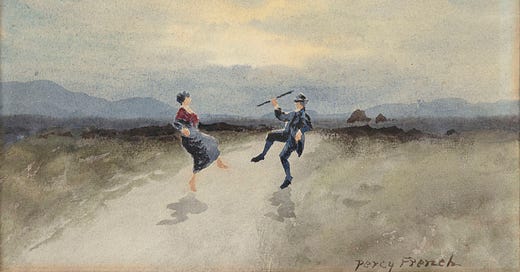I read a lot of fantasy novels when I was a teenager. You can probably tell. Most of them passed me by - in the vast wake of Tolkein, genuinely original fantasy is a hard sea to navigate - but a few stood out. Ursula Le Guin’s Earthsea books have never left me, and Stephen Donaldson’s Thomas Covenant trilogy made a lasting impression too. Part of me still wants to write fantasy novels. Another part thinks I already have.
But there was another book which stood out for one particular reason: the plot device which set it in motion. For this alone, Julian May’s novel The Many-Coloured Land has stayed with me for the last 35 years, even as I’ve long forgotten everything else about the book. It has the kind of premise you wish you’d thought of yourself. Time travel has been discovered, but it turns out to be a limited technology. Only one time machine exists, and it can only take people in one direction: into the past. Moreover, it can only take travellers to one specific time and place: an area of France in the Pleistocene epoch, five million years ago. Finally, the time machine only operates in one direction, which means that once you go, there is no changing your mind.
Naturally this offer only attracts a certain type of person. Discontents, or those with something to run from, or Romantics, or wild adventurers, or those who want to build or inhabit an entirely different world: these are the kinds of people who take up the offer. I don’t think I’m spoiling the book to say that when those people get to the Pleistocene, it’s not what they expect it to be.
The traditionalist thinker Frithjof Schuon once wrote that the pre-modern world was a good thing which contained much evil, while the modern world is an evil thing which contains much good. Given this, he said, it would be madness to prefer the new to the old. If you’ve been reading me for the last two years, you’ll know I’m mostly in agreement. Machine modernity is killing us. It exists to systematically uproot, invert and dissolve all traditional ways of being, from family life to the way we eat, all the while telling us a story that the consequent loss of roots, culture and meaning equates to something called ‘liberation.’ Perhaps I would have been the kind of person who would have taken that chance on a new start in the Pleistocene. I’m not sure. Perhaps I’m all talk. Maybe until a time machine appears we don’t get to find out.
But there is no time machine. We can’t go back, to the Pleistocene or any other pre-modern time. Even those of us who feel powerfully the errors of the modern world, and who can see where the Machine is taking us, are living within the city walls. We are, in almost all cases, cooked barbarians. We are here and it is now. Schuon was right; but there is no return, for either Romantics or realists.
There is only going through.
Two months ago I was standing on the west coast of Kerry, in view of the Blasket Islands, with one of Ireland’s best-known traditional musicians, a man from a long-established musical dynasty. We’d only just met. He was the sort of man that the Irish west used to produce by the dozen, but who is rare enough now. He knew who he was and where he was, and he wouldn’t shy from saying it.
Where are you from? he asked me.
England, I said.
I know that, he said, but where?
Well, my family are from London, I said, so I suppose I’m a Londoner.
You can do better than that, he said, and then looked directly at me until I did.
Well, I responded, hesitantly, I don’t really come from anywhere. The southeast, I suppose. My family moved around. But my surname is Kentish. Kingsnorth is a village in Kent. I can trace my ancestors back there a thousand years. I’ve visited the churchyard they’re buried in.
Well then, he said, that’s where you’re from. Those are your people.
Yes, I said, I suppose that’s right.
You know, he said to me, squinting into the wind, the English tried to eliminate the Irish from the Earth. From Queen Elizabeth onward, that was policy. They wanted us gone, we were savages. That was what the English did. But I’ve said to people for a long time: we can’t blame the English people for that. We can blame the crown, but not the people. When I look at England today, I see a people who have no clue who they are.
No, we don’t have a clue, I said, and that’s policy too. They couldn’t uproot the world until they’d uprooted us.
In England, when you meet someone new, it’s common to ask them what they do. In Ireland, it’s common to ask them where they’re from, and it’s a highly localised question. ‘Where are you from?’ in the countryside means which village, townland or house, rather than which nation or even county. This way of locating people in space is very ancient. Who are your people? it asks, and what is your place? It’s a way of seeing that is dying now, and would not be found amongst the new urban generations, for whom all places are much the same, all mediated from within the digital non-place we drift amongst. But this old question - where are you from? - is the universal, aboriginal enquiry. It cuts to the heart of the matter.
Keep reading with a 7-day free trial
Subscribe to The Abbey of Misrule to keep reading this post and get 7 days of free access to the full post archives.





